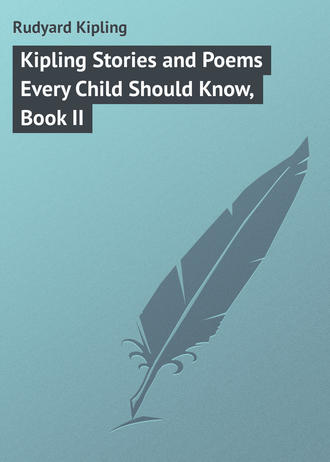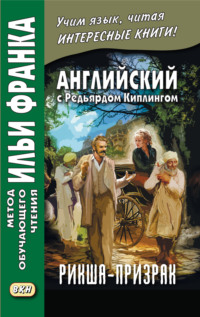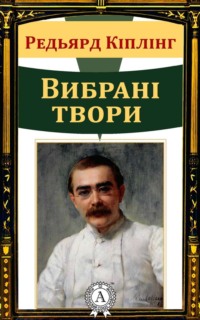 полная версия
полная версияKipling Stories and Poems Every Child Should Know, Book II
"Ay, all save one that makes love in the hearts of men," said Krishna, knotting his girdle. "It is but a little time to wait, and ye shall know if I lie."
"Truly it is but a little time, as thou sayest, and we shall know. Get thee to thy huts again, beloved, and make sport for the young things, for still Brahm dreams. Go, my children! Brahm dreams – and till He wakes the Gods die not."
"Whither went they?" said the Lascar, awe-struck, shivering a little with the cold.
"God knows!" said Findlayson. The river and the island lay in full daylight now, and there was never mark of hoof or pug on the wet earth under the peepul. Only a parrot screamed in the branches, bringing down showers of water-drops as he fluttered his wings.
"Up! We are cramped with cold! Has the opium died out? Canst thou move, Sahib?"
Findlayson staggered to his feet and shook himself. His head swam and ached, but the work of the opium was over, and, as he sluiced his forehead in a pool, the Chief Engineer of the Kashi Bridge was wondering how he had managed to fall upon the island, what chances the day offered of return, and, above all, how his work stood.
"Peroo, I have forgotten much. I was under the guard-tower watching the river; and then – Did the flood sweep us away?"
"No. The boats broke loose, Sahib, and" (if the Sahib had forgotten about the opium, decidedly Peroo would not remind him) "in striving to retie them, so it seemed to me – but it was dark – a rope caught the Sahib and threw him upon a boat. Considering that we two, with Hitchcock Sahib, built, as it were, that bridge, I came also upon the boat, which came riding on horseback, as it were, on the nose of this island, and so, splitting, cast us ashore. I made a great cry when the boat left the wharf, and without doubt Hitchcock Sahib will come for us. As for the bridge, so many have died in the building that it cannot fall."
A fierce sun, that drew out all the smell of the sodden land, had followed the storm, and in that clear light there was no room for a man to think of dreams of the dark. Findlayson stared up-stream, across the blaze of moving water, till his eyes ached. There was no sign of any bank to the Ganges, much less of a bridge-line.
"We came down far," he said. "It was wonderful that we were not drowned a hundred times."
"That was the least of the wonder, for no man dies before his time. I have seen Sydney, I have seen London, and twenty great ports, but" – Peroo looked at the damp, discoloured shrine under the peepul – "never man has seen that we saw here."
"What?"
"Has the Sahib forgotten; or do we black men only see the Gods?"
"There was a fever upon me." Findlayson was still looking uneasily across the water. "It seemed that the island was full of beasts and men talking, but I do not remember. A boat could live in this water now, I think."
"Oho! Then it is true. 'When Brahm ceases to dream, the Gods die.' Now I know, indeed, what he meant. Once, too, the guru said as much to me; but then I did not understand. Now I am wise."
"What?" said Findlayson over his shoulder.
Peroo went on as if he were talking to himself. "Six – seven – ten monsoons since, I was watch on the fo'c'sle of the Rewah– the Kumpani's big boat – and there was a big tufan, green and black water beating; and I held fast to the life-lines, choking under the waters. Then I thought of the Gods – of Those whom we saw to-night" – he stared curiously at Findlayson's back, but the white man was looking across the flood. "Yes, I say of Those whom we saw this night past, and I called upon Them to protect me. And while I prayed, still keeping my lookout, a big wave came and threw me forward upon the ring of the great black bow-anchor, and the Rewah rose high and high, leaning toward the left-hand side, and the water drew away from beneath her nose, and I lay upon my belly, holding the ring, and looking down into those great deeps. Then I thought, even in the face of death, if I lose hold I die, and for me neither the Rewah nor my place by the galley where the rice is cooked, nor Bombay, nor Calcutta, nor even London, will be any more for me. 'How shall I be sure,' I said, 'that the Gods to whom I pray will abide at all?' This I thought, and the Rewah dropped her nose as a hammer falls, and all the sea came in and slid me backward along the fo'c'sle and over the break of the fo'c'sle, and I very badly bruised my shin against the donkey-engine: but I did not die, and I have seen the Gods. They are good for live men, but for the dead – They have spoken Themselves. Therefore, when I come to the village I will beat the guru for talking riddles which are no riddles. When Brahm ceases to dream, the Gods go."
"Look up-stream. The light blinds. Is there smoke yonder?"
Peroo shaded his eyes with his hands. "He is a wise man and quick. Hitchcock Sahib would not trust a rowboat. He has borrowed the Rao Sahib's steam-launch, and comes to look for us. I have always said that there should have been a steam-launch on the bridge-works for us."
The territory of the Rao of Baraon lay within ten miles of the bridge; and Findlayson and Hitchcock had spent a fair portion of their scanty leisure in playing billiards and shooting Black-buck with the young man. He had been bear-led by an English tutor of sporting tastes for some five or six years, and was now royally wasting the revenues accumulated during his minority by the Indian Government. His steam-launch, with its silver-plated rails, striped silk awning, and mahogany decks, was a new toy which Findlayson had found horribly in the way when the Rao came to look at the bridge-works.
"It's great luck," murmured Findlayson, but he was none the less afraid, wondering what news might be of the bridge.
The gaudy blue and white funnel came down-stream swiftly. They could see Hitchcock in the bows, with a pair of opera-glasses, and his face was unusually white. Then Peroo hailed, and the launch made for the tail of the island. The Rao Sahib, in tweed shooting-suit and a seven-hued turban, waved his royal hand, and Hitchcock shouted. But he need have asked no questions, for Findlayson's first demand was for his bridge.
"All serene! 'Gad, I never expected to see you again, Findlayson. You're seven koss down-stream. Yes, there's not a stone shifted anywhere; but how are you? I borrowed the Rao Sahib's launch, and he was good enough to come along. Jump in."
"Ah, Finlinson, you are very well, eh? That was most unprecedented calamity last night, eh? My royal palace, too, it leaks like the devil, and the crops will also be short all about my country. Now you shall back her out, Hitchcock. I – I do not understand steam-engines. You are wet? You are cold Finlinson? I have some things to eat here, and you will take a good drink."
"I'm immensely grateful, Rao Sahib. I believe you've saved my life. How did Hitchcock – "
"Oho! His hair was upon end. He rode to me in the middle of the night and woke me up in the arms of Morphus. I was most truly concerned, Finlinson, so I came too. My head-priest he is very angry just now. We will go quick, Mister Hitchcock. I am due to attend at twelve-forty-five in the state temple, where we sanctify some new idol. If not so I would have asked you to spend the day with me. They are dam-bore, these religious ceremonies, Finlinson, eh?"
Peroo, well known to the crew, had possessed himself of the wheel, and was taking the launch craftily up-stream. But while he steered he was, in his mind, handling two feet of partially untwisted wire-rope; and the back upon which he beat was the back of his guru.
IV
THE MIRACLES
I sent a message to my dear —A thousand leagues and more to her —The dumb sea-levels thrilled to hear,And lost Atlantis bore to her.Behind my message hard I came,And nigh had found a grave for me;But that I launched of steel and flameDid war against the wave for me.Uprose the deep, by gale on gale,To bid me change my mind again —He broke his teeth along my rail,And, roaring, swung behind again.I stayed the sun at noon to tellMy way across the waste of it;I read the storm before it fellAnd made the better haste of it.Afar, I hailed the land at night —The towers I built had heard of me —And, ere my rocket reached its height,Had flashed my Love the word of me.Earth gave her chosen men of strength(They lived and strove and died for me)To drive my road a nation's length,And toss the miles aside for me.I snatched their toil to serve my needs —Too slow their fleetest flew for me —I tired twenty smoking steeds,And bade them bait a new for me.I sent the lightnings forth to seeWhere hour by hour she waited me.Among ten million one was she,And surely all men hated me!Dawn ran to meet us at my goal —Ah, day no tongue shall tell again! —And little folk of little soulRose up to buy and sell again!V
OUR LADY OF THE SNOWS
1897(Canadian Preferential Tariff, 1897)A Nation spoke to a Nation.A Queen sent word to a Throne:"Daughter am I in my mother's houseBut mistress in my own.The gates are mine to open,As the gates are mine to close,And I set my house in order,"Said our Lady of the Snows."Neither with laughter nor weeping,Fear or the child's amaze —Soberly under the White Man's lawMy white men go their ways.Not for the Gentiles' clamour —Insult or threat of blows —Bow we the knee to Baal,"Said our Lady of the Snows."My speech is clean and single,I talk of common things —Words of the wharf and the market-placeAnd the ware the merchant brings:Favour to those I favour,But a stumbling-block to my foes.Many there be that hate us,"Said our Lady of the Snows."I called my chiefs to councilIn the din of a troubled year;For the sake of a sign ye would not see,And a word ye would not hear.This is our message and answer;This is the path we chose:For we be also a people,"Said our Lady of the Snows."Carry the word to my sisters —To the Queens of the East and the SouthI have proven faith in the HeritageBy more than the word of the mouth.They that are wise may followEre the world's war-trumpet blows,But I – I am first in the battle,"Said our Lady of the Snows.A Nation spoke to a Nation,A Throne sent word to a Throne:"Daughter am I in my mother's house,But mistress in my own.The gates are mine to open,As the gates are mine to close,And I abide by my Mother's House,"Said our Lady of the Snows.VI
THE SONG OF THE WOMEN
(Lady Dufferin's Fund for medical Aid to the Women of India)How shall she know the worship we would do her?The walls are high, and she is very far.How shall the women's message reach unto herAbove the tumult of the packed bazaar?Free wind of March, against the lattice blowing,Bear thou our thanks, lest she depart unknowing.Go forth across the fields we may not roam in,Go forth beyond the trees that rim the city,To whatsoe'er fair place she hath her home in,Who dowered us with wealth of love and pity.Out of our shadow pass, and seek her singing —"I have no gifts but Love alone for bringing."Say that we be a feeble folk who greet her,But old in grief, and very wise in tears;Say that we, being desolate, entreat herThat she forget us not in after years;For we have seen the light, and it were grievousTo dim that dawning if our lady leave us.By life that ebbed with none to stanch the failing,By love's sad harvest garnered in the spring,When Love in ignorance wept unavailingO'er young buds dead before their blossoming;By all the gray owl watched, the pale moon viewed,In past grim years, declare our gratitude!By hands uplifted to the Gods that heard not,By gifts that found no favour in their sight,By faces bent above the babe that stirred not,By nameless horrors of the stifling night;By ills foredone, by peace her toils discover,Bid Earth be good beneath and Heaven above her!If she have sent her servants in our pain,If she have fought with Death and dulled his sword;If she have given back our sick again,And to the breast the weakling lips restored,Is it a little thing that she has wrought?Then Life and Death and Motherhood be naught.Go forth, oh, wind, our message on thy wings,And they shall hear thee pass and bid thee speed,In red-roofed hut, or white-walled home of kings,Who have been helped by her in their need.All spring shall give thee fragrance, and the wheatShall be a tasselled floor-cloth to thy feet.Haste, for our hearts are with thee, take no rest,Loud-voiced ambassador, from sea to seaProclaim the blessing, manifold, confest,Of those in darkness by her hand set free;Then very softly to her presence move,And whisper: "Lady, lo, they know and love!"VII
THE WHITE MAN'S BURDEN
1899Take up the White Man's burden —Send forth the best ye breed —Go bind your sons to exileTo serve your captives' need;To wait in heavy harness,On fluttered folk and wild —Your new-caught, sullen peoples,Half-devil and half child.Take up the White Man's burden —In patience to abide,To veil the threat of terrorAnd check the show of pride;By open speech and simple,An hundred times made plain,To seek another's profit,And work another's gain.Take up the White Man's burden —The savage wars of peace —Fill full the mouth of FamineAnd bid the sickness cease;And when your goal is nearestThe end for others sought,Watch Sloth and heathen FollyBring all your hope to naught.Take up the White Man's burden —No tawdry rule of kings,But toil of serf and sweeper —The tale of common things.The ports ye shall not enter,The roads ye shall not tread,Go make them with your living,And mark them with your dead.Take up the White Man's burden —And reap his old reward;The blame of those ye better,The hate of those ye guard —The cry of hosts ye humour(Ah, slowly!) toward the light: —"Why brought ye us from bondage,Our loved Egyptian night?"Take up the White Man's burden —Ye dare not stoop to less —Nor call too loud on FreedomTo cloak your weariness;By all ye cry or whisper,By all ye leave or do,The silent, sullen peoplesShall weigh your Gods and you.Take up the White Man's burden —Have done with childish days —The lightly proffered laurelThe easy, ungrudged praise.Comes now, to search your manhoodThrough all the thankless years,Cold, edged with dear-bought wisdom,The judgment of your peers!1
A selection from "Captains Courageous," copyrighted by The Century Company.
2
Copyrighted, 1891, by Harper & Brothers.











